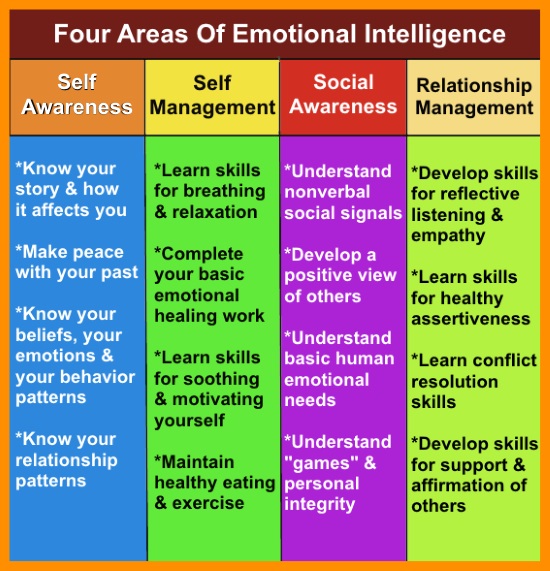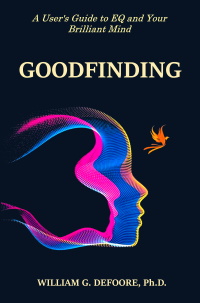What Is Emotional Intelligence?
How To Increase It And Improve Your Life & Well Being
Authored by William G. DeFoore, Ph.D.
The reason so many ask "what is emotional intelligence" is that the term "emotional intelligence" seems like an oxymoron. Usually we think that someone is either emotional or intelligent, but rarely do we think of anybody being both intelligent and emotional at the same time.
If you dive into some of the brain research behind emotional intelligence (EI) it can get complex, but we're going to simplify it for you here, so you can put it to use in your own life.
There are four domains, or areas of EI, and here's an overview for you:
We will look at each of those areas in more depth below. This is a very large topic, so be sure and check out the links on this page for further information.
First, let's try to get a more general understanding of EI and how it differs from IQ.
What Is Emotional Intelligence In A Nutshell?
Here are some short overview statements about EI that will be helpful to you:
- Emotional intelligence means being both emotional and intelligent at the same time.
- Having a high level of EI means that you 1) understand emotions and 2) are good at managing and expressing them.
- EI involves the whole brain, taking left brain, right brain and primal brain processes into account. IQ (Intellectual Quotient), which we normally think of as "intelligence," primarily involves left brain processes, and only secondarily includes some right brain functions.
- When you engage your entire brain while developing your EI, you are actually benefiting your entire body, since right brain and primal brain processes involve more physiological functions than intellectual processes alone.
You start raising your EI and using more of your brain when you ask the question, "what is emotional intelligence?" Asking questions opens you to learning and expanding your awareness, so keep going with that expansion, as you continue to learn.
OK, now let's get more into the heart of the matter...how to increase your emotional intelligence.
What Is Emotional Intelligence In Four Categories?
Now we'll go into more depth regarding each of the components of the chart above. This will begin to point you to specific, practical steps you can take to begin improving your level of EI, and, you will have an answer to your question of what is emotional intelligence.
I. Self Awareness
- Understand your personal history and how it affected you. If you don't know your personal history, you won't understand your emotions or why you react to certain situations the way you do -- you won't know your own "hot buttons."
- Once you have an understanding of your past experiences, you will need to make peace with them. There are clearly defined steps you can follow to achieve this.
- As you examine your significant past experiences, you will identify the beliefs, emotional patterns and behavior patterns that resulted. This is where you will be bringing subconscious processes into conscious awareness.
- Out of all of this you will begin to see the role you play in your relationships, and the types of dynamic patterns you tend to create over and over.
"If you don't work on your past, it will work on you. Your history is a vast resource of energy and insight, waiting for you to illuminate it with the light of your awareness."
William DeFoore
II. Self Management
- Healthy breathing patterns and physical relaxation skills are essential components to successful self management. This is foundational, and without this basic self management skill set, other techniques won't work or won't last.
- Another foundational piece is how you maintain your physical body. Healthy eating patterns and a good, consistent exercise program prevent many problems, and contribute greatly to every aspect of your functioning.
- Having done your personal history review, part of your ongoing process is to work toward completing your emotional healing process from past difficulties and trauma.
- Self soothing and self motivation are absolutely necessary for managing your enthusiasm and energy level on an ongoing basis.
Begin developing your self management skills now, and accelerate your journey to greater emotional intelligence.
III. Social Awareness
- Learn to understand and identify nonverbal social signals, and this will greatly improve your social skills and the quality of your relationships.
- With only a few rare exceptions, people basically want to connect and have a good time in social situations. Believing the best of others will help you tremendously to build strong connections.
- We have a lot in common as human beings, and when you understand peoples' basic needs for validation, acknowledgment and authentic connection, you will be well equipped to navigate the sometimes tricky realm of social interactions.
- Many people are caught in unconscious "games" such as one-up-manship and playing the victim. Learn about these patterns of interaction and the basic meaning of human integrity, and you can master the realm of socializing, whether with close loved ones or casual acquaintances.
IV. Relationship Management
- Reflective listening and empathy skills are absolutely necessary for building and maintaining healthy, lasting relationships. They are essential to forming connections and resolving conflict in all personal and professional relationships.
- Assertiveness skills give you the ability to appropriately and effectively get your point across and set firm personal boundaries. Stating preferences and saying "No" and "Yes" clearly and confidently are some of the skills of assertiveness.
- Conflict resolution skills not only help you resolve conflicts as they arise, they will give you confidence as you venture into uncharted territory in new and challenging relationships.
- When you learn to authentically and appropriately affirm, acknowledge and support others, you will be truly exceptional in your relationship management. These skills are somewhat rare, and you set yourself apart from the crowd when you you master them.
Now you have the basic information you need to answer the question "What is emotional intelligence?" Be sure and read the additional pages (coming soon...) that elaborate on each of the above four areas of EI.
More Great Articles To Help You Answer
"What Is Emotional Intelligence?"
- Developing Self Awareness -- The first step to improving emotional intelligence is a very important one. Learn how to get this done in four clear steps.
- Self Management Skills -- The second step in creating positive levels of emotional intelligence is covered in this page which gives you a step-by-step program for successful self management.
- Self Motivation Skills -- Learn all of the essential ingredients to get you up and running with all of your goals you'd like to accomplish, using your emotional intelligence along the way.
- Social Awareness -- Understanding nonverbal signals, basic human needs and the importance of integrity and a positive viewpoint gives you a great advantage in the process of developing great, lasting relationships.
- Relationship Management -- Learn to succeed in all of your relationships by building a sense of trust between you and the other person. All of the steps are here, so get started!
- Emotional Intelligence Definition -- Get some practical answers to "what is emotional intelligence," and further ways to simplify and understand this important concept.
Have A Great Story Or Question About Anything Related To Emotional Intelligence?
Do you have a great story or question about emotional intelligence, anything related to it? Please share it!








New! Comments
We'd love to hear from you! Leave us a comment in the box below.